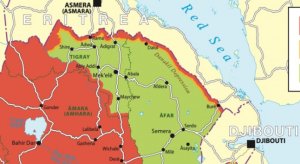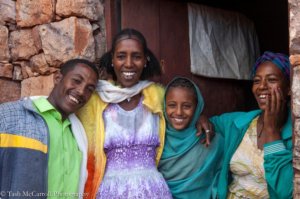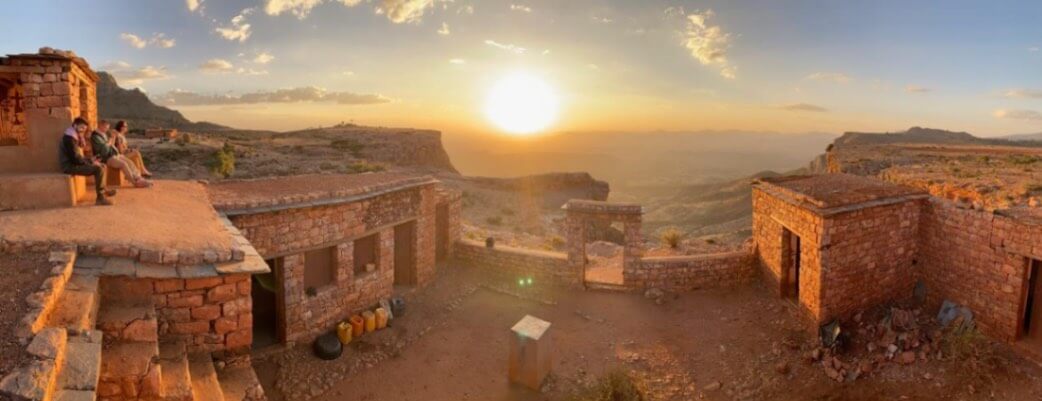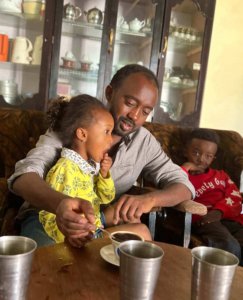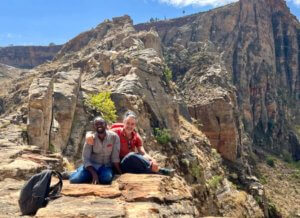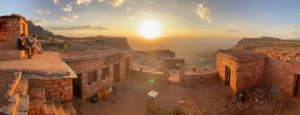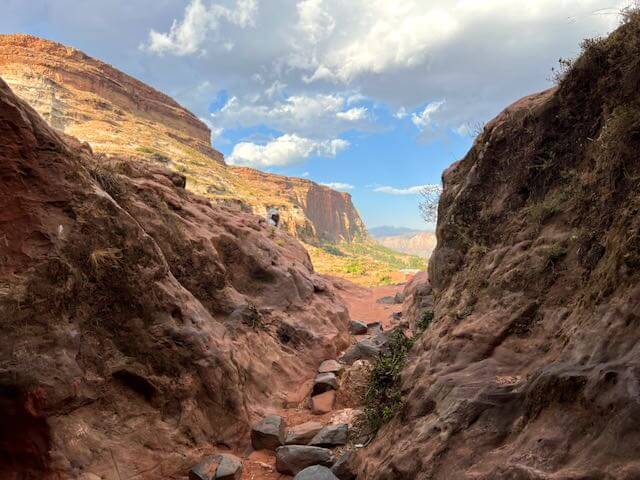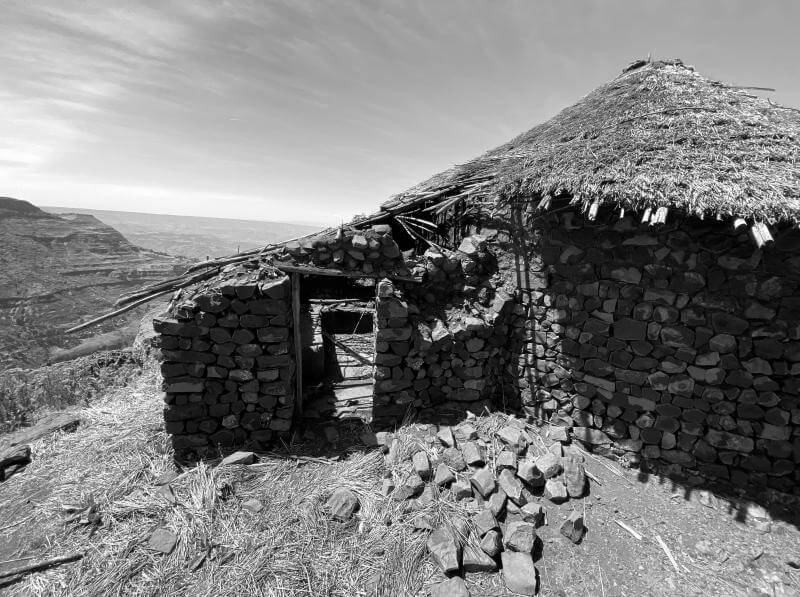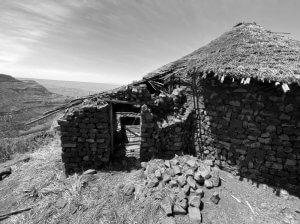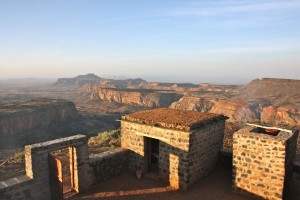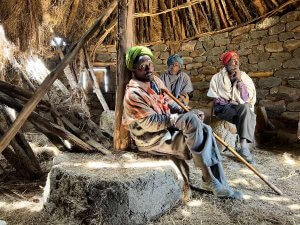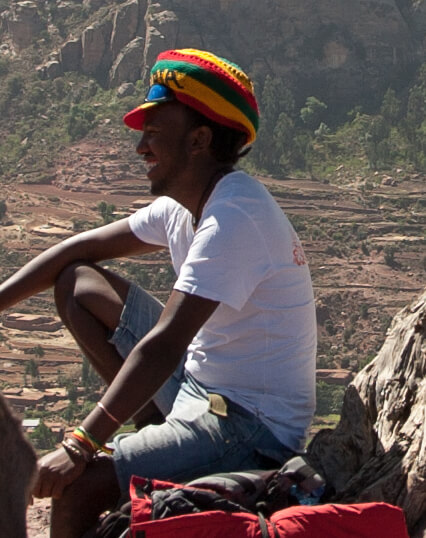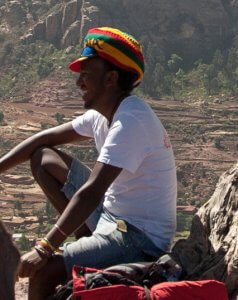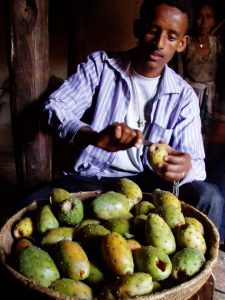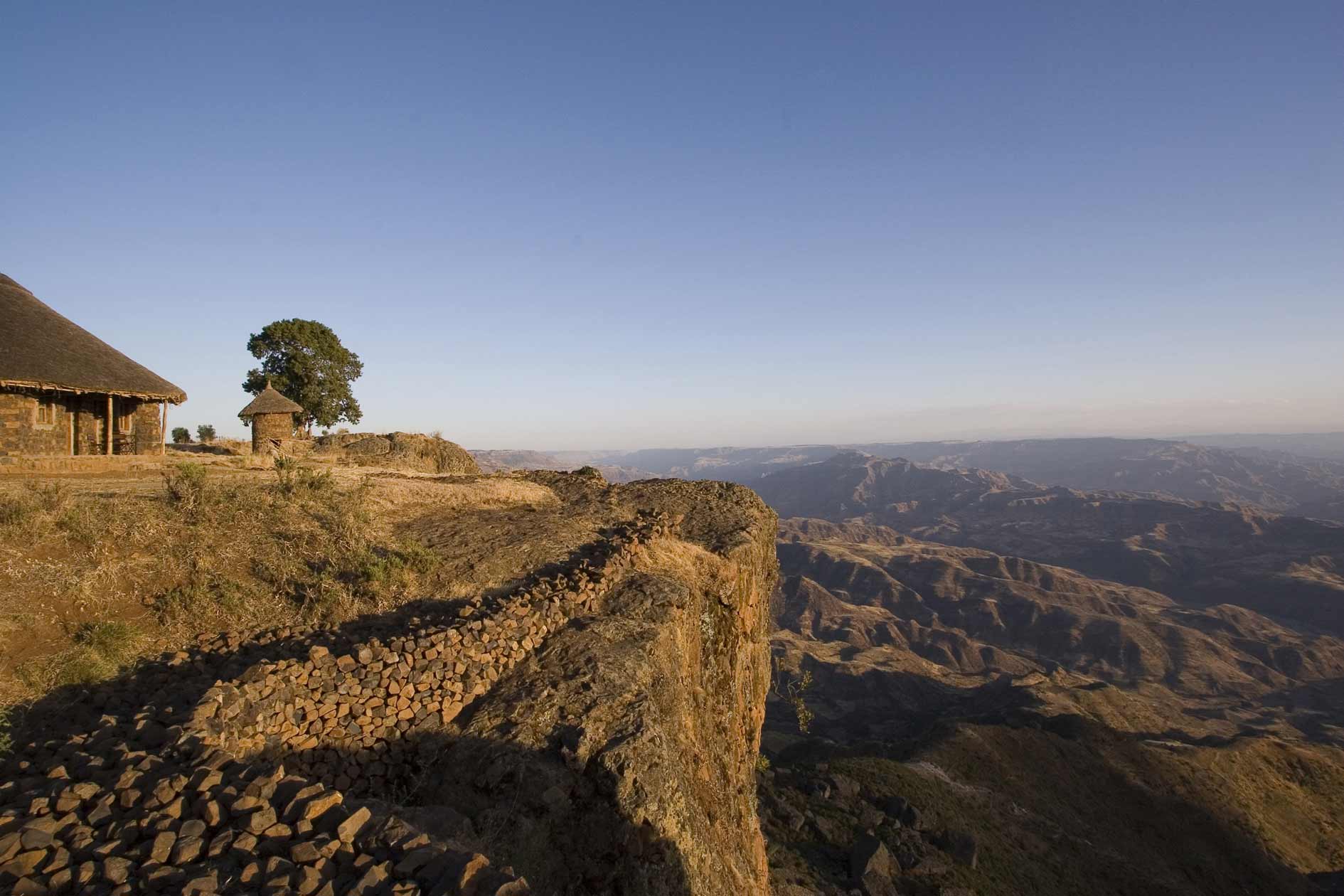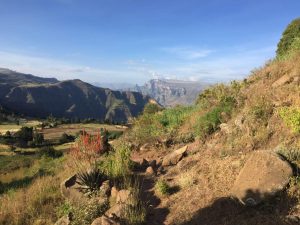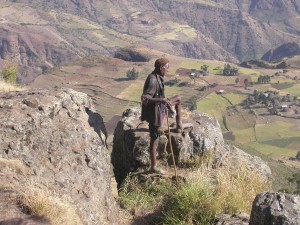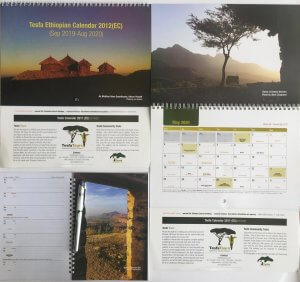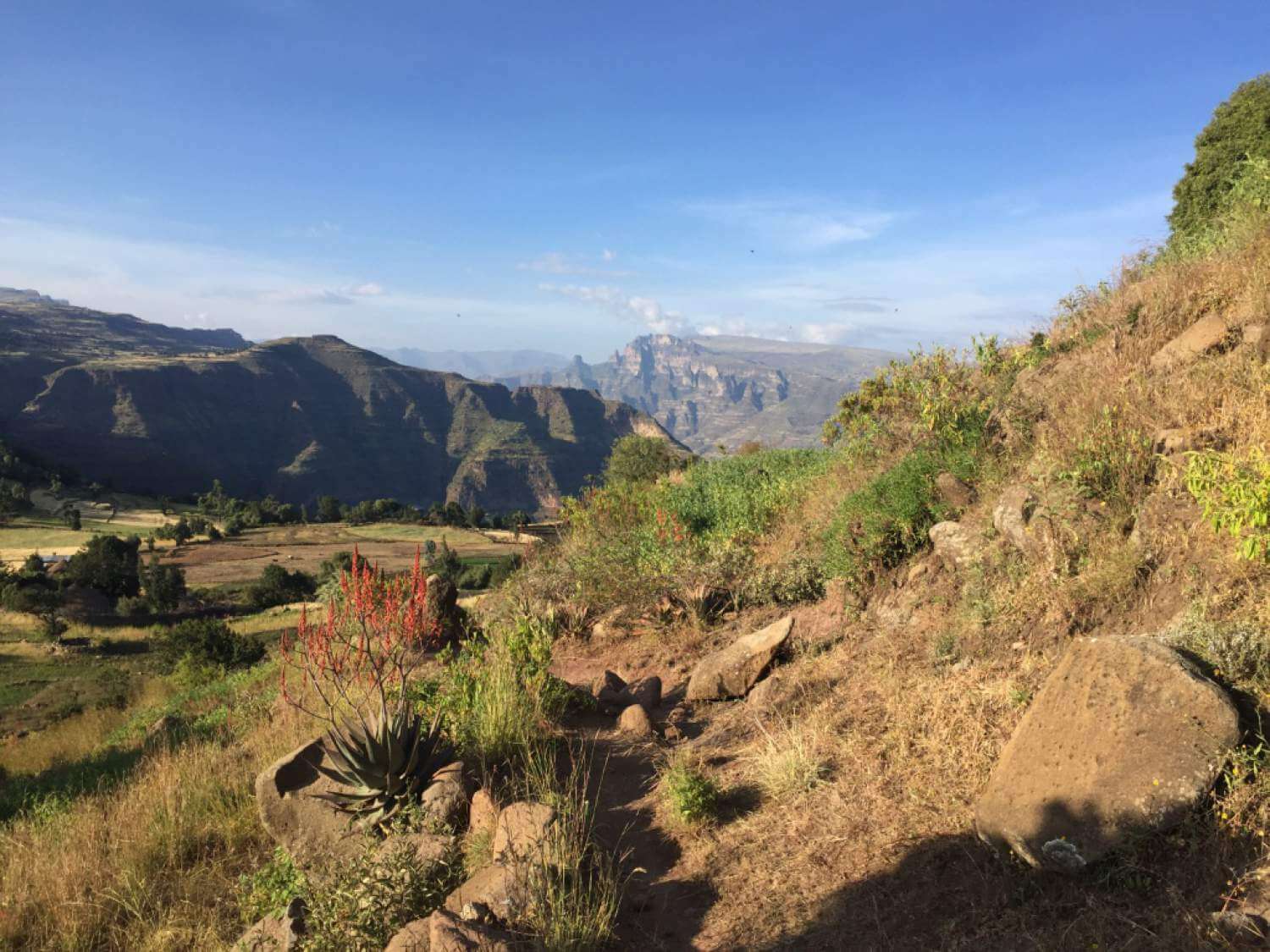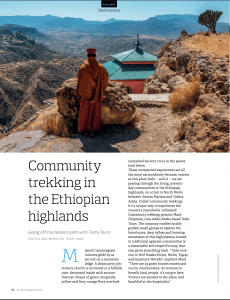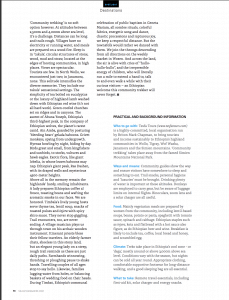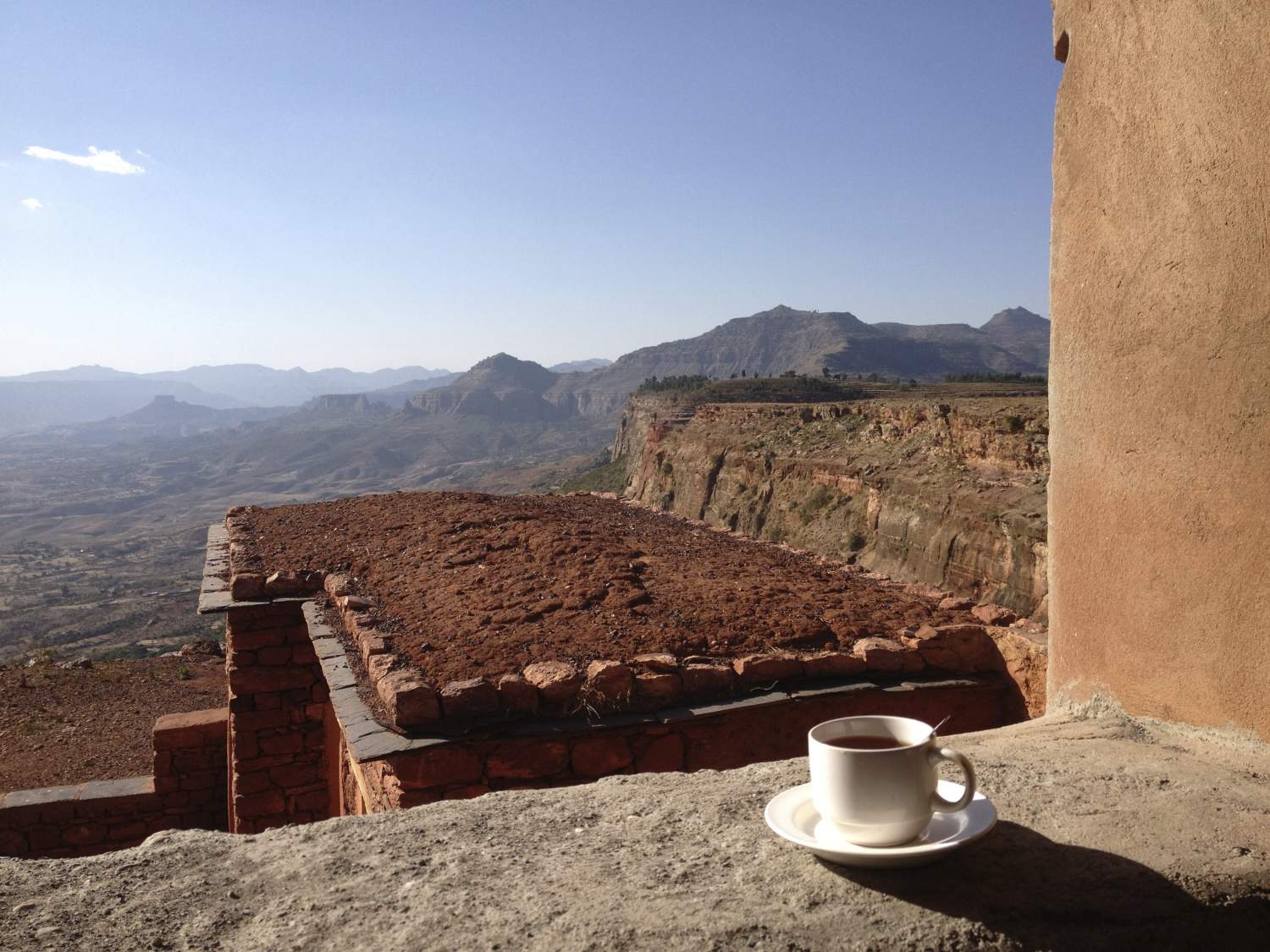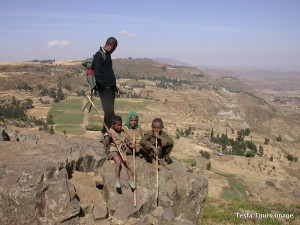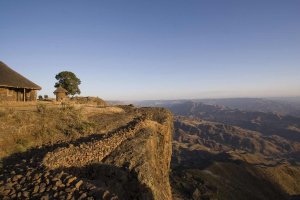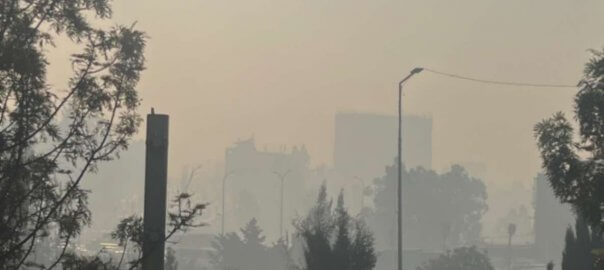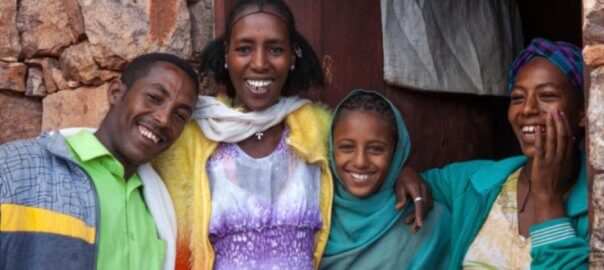Visiting Tigray after 3 years
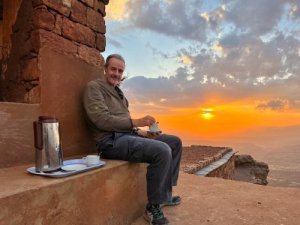
Hospitality in Tigray community guesthouses
I like to get around the country and visit the places we send our clients, especially the community treks. It’s important to talk to our guides and the communities and for them to see me and of course to see the state of repair of the guesthouses and their materials. However when 3 years ago, the cloud of Covid descended on the planet, all travel ceased. Then with the conflict that embroiled Tigray from Nov 2020, there was no way to visit Tigray, and for much of the time even no way to call. With the peace accords signed in Pretoria at the start of November 2022 much has changed and it is possible to fly into the region again, so I flew early on Monday morning at the end of February, on an Ethiopian Airlines Bombardier – a small 80 seater twin engined aircraft the airline use for domestic routes, to Tigray’s capital – Mekele.
I was excited to see good friends, but a bit worried by what I might find after the conflict that took so many lives and saw so much destruction. A good friend lent me a car and driver to head north from Mekele to the town of Adigrat, with a full programme that would put my limbs to the test. There were two challenges with flying to Mekele, firstly the airline only sells a one-way flight, so we arranged for a friend to buy my return flight on Wednesday (a day ahead of travel), and secondly Ethiopian airlines do not send passengers luggage with them. So when my flight arrived soon after 9 am we all waited by the conveyor belt to find the luggage that came was from the previous day’s passengers!
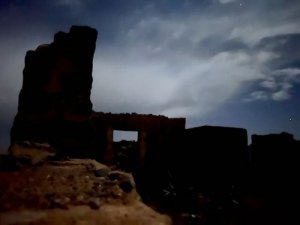
Enaf – damaged – in the moonlight
My bag finally arrived at 3pm on the fifth flight of the day. As a result we had to modify our original plan, and by the time we got up to the guesthouse on top of the mountain at Enaf, just south west of Adigrat it was dark. Even in the dark I could see that almost all the roofs had collapsed, because the ENDF troops had taken the plastic sheeting from inside the roof (underneath the packed soil) so some walls have partially or totally collapse but at least some part of the structure remained intact. Nevertheless a lot of work to get this wonderful guesthouse back in operation.
We had a quick meeting with five members of the community who very kindly bought a flask of tea which was gratefully received. We discussed the costs of clearing up the rubble fixing the walls and putting on a new roof. But for me the most important question was whether the community wanted to host tourists. After everything that the community have been through I wanted to be clear that this was what they wanted to do. It couldn’t of been clearer -a resounding yes (in Tigrinya “Ahwa’ ) and not only did people speak in the positive but they were big smiles, it was very clear that the community here would love tourists to come back as soon as possible.
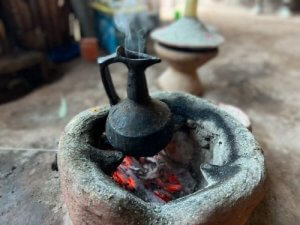
Coffee being brewed at Seheta
From the ruined Enaf guesthouse we walked down the mountain in the dark going down very steep paths. We didn’t reach the next guest house – Seheta until around 9:30 pm. Here we slept in Gebre Hiwot’s house. He is the camp manager at Seheta and we were treated to t’ehlo – barley balls eaten with spicy sauce which is the traditional food for this area. We had amazing kita bread, about the tastiest bread you can imagine and delicious couple of cups of brown home prepared coffee – all washed down with the local beer known as suwa. I had a great sleep on the bed in one off their rooms – built as per Tesfa Tours technique on a raised slot. I am frequently bowled over by the hospitality in Ethiopia, it is humbling.
Exploring the Valleys
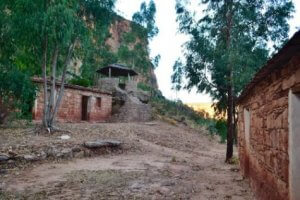
Seheta Guesthouse early morning
I woke up early on Tuesday morning to see the red rock landscape with cliffs around the village. The guesthouse at Seheta is undamaged and meeting with the community they explained that they’ve taken care of the guesthouse and materials (only a few were lost) because they want guests back. In fact we could have slept in the guesthouse but it just needed cleaning. After a great breakfast and copious cups of coffee brewed by Gebre Hiwot’s wife Rahel we set off.
Our first stop was to check out Gohgot guesthouse. It was a beautiful walk through the Seheta valley with the red rock cliffs and the beautiful red stone ‘hedamo‘ farm houses (as the traditional style is called) tucked in amongst eucalyptus trees. It’s a bit of a climb up to the guesthouse which sits on a high bit of land underneath a cliff. We were pleased to find the guesthouse in very good condition and just needing a bit of a clean out. The community came to meet us and again they expressed the wish to receive tourists as soon as possible telling us that was why did they look after the guesthouse and materials. They had an inventory of materials that were missing and materials that were still in store and they have enough to be going on with. From here we headed eastward into the valley behind to search for a church that is inside the cliffs.
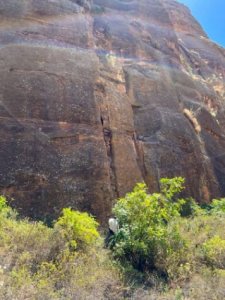
Rock face with possible church inside
A book was discovered at the nearby Teklehaimanot church, that tells of the existence of this church and where to find it. Through a crack in the rock the corner of shaped stones can be seen, but only just. To the left of this was a strange stack of cut rocks filling recess in the cliff. These had the same weathered face but smooth sides and deeper into the recess were also smooth sides so it seemed as if these rocks had been put back in but further out than their original position. It is a mystery how anyone would have cut this rock surface unless they had a saw that goes through rock! We speculated that there has to be a way in from above. It appears that there was a way to climb up to a platform but it’s difficult to see anything from way below. My suggestion was that Berhe (who is a great climber) and a few others come up and climb up the rock face to see if there is any other possible entrance.
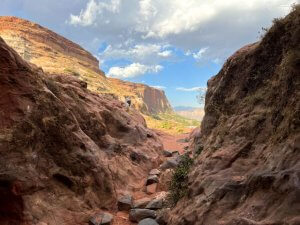
Looking out from Shikurto Tunnel near Shimbrety
We then headed westward out of the valley towards Shimbrety, stopping for lunch at the house of one of the cooks from Gohgot. She was also preparing fresh suwa and enjara to take to church as it was the monthly Mariam day. Refreshed, we set off on our way again walking fast to reach the guest house before sunset. There were a number of TDF soldiers billeted at random houses, a school and just walking across the country. All were unarmed and very polite, and giving me no sense of a security issue, in fact the reverse, their presence unarmed seems to be evidence that it is quiet and peaceful. We passed one lovely old man who told Berhe that seeing me here, showed him that the dawn was coming. He was referring to the long night that Tigray had passed through, and to see a guest in the countryside was a sign that times have changed.
The final part of the walk took us up to the Shikurto tunnel that has been carved through the mountain allowing people to come from the market area at Idega Arbi to the lands to the west. We climbed up the escarpment beside the rock church of Mariam Buzuhan, taking the short but steepest way to the top of the escarpment. The views were stunning as the sun had not yet gone down and we had a nice little walk to the guesthouse which shows clearly on the skyline.
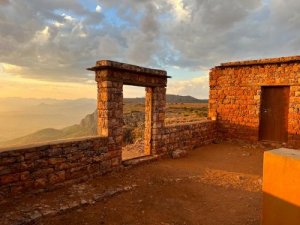
Shimbrety Guesthouse at sunset
We were met by a number of the Shimbrety staff at the guesthouse, including Hagos, the manager at the camp and a wonderful smiling person. I had met him the very first time I walked here and he had immediately understood what we wanted to do and agreed to work with us. He has always been one of the best people in the whole project. I gratefully drank several cups of sweet tea watching the sun go down before heading to Hagos’ house to pay our traditional respects, as his father had died a year and a half before. Of course neither myself nor Berhe, had been able to visit him. Back at the guesthouse we were served a great dinner of rice, shiro, greens, tomato sauce and a lovely spicy sauce. I spent ten minutes watching the moon and the stars – so beautiful, but I was tired I went to bed early sleeping soundly till morning.
Across the mountains
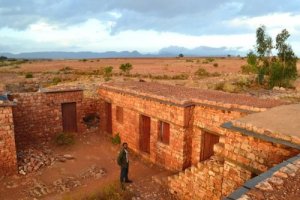
Hagos at Shimbrety
It was hard to pull myself out of out of bed, it was so comfortable and quiet, but after a good breakfast we set off northwards towards Erar guesthouse. There are two routes: the walk in the valley route or the tougher route up over the mountains. We chose the across the mountains for the rewarding views and Gelada baboons. The path down drops off the plateau at a spring, where there is a crack in the escarpment edge. We filled our water bottles using a filtering pump. While there I scooped water out into a rock trough for a persistent donkey. After a bit the guide scooped more for him. I thought about how we cared for a thirsty donkey and how some people don’t even treat their fellow people properly to ensure they have food, water and shelter.
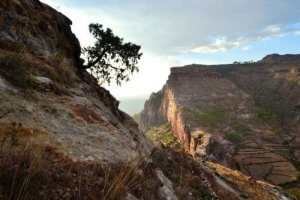
The landscape between Shimbrety & Erar
It’s a great path clinging to the mountain side – several meters wide with a sheer drop on your right and a cliff on your left. The views are beyond description with a lot of Gelada baboons. The path took us back down to the church if Mariam Buzuhan and the tunnel through the cliff. But now we climbed the mountain north of the tunnel. The trail follows the flat mountain top with the great sandstone escarpment on its western flank, perpendicular yet cut with gullies and promontories. The sandstone has iron stone – hematite I think – loose along the surface.
After several downs and ups where the escarpment drops down we came to Erar guesthouse – sadly this was more damaged than the others we had seen. It seemed shells had hit the structure and the front walls had been taken down when Eritrean army was there. The guesthouse will need a complete rebuild. We trekked down to the village just east of the site and met with a guard from the guesthouse. We learned that the community was ok and had saved many of the materials and that they wanted to host tourists again.
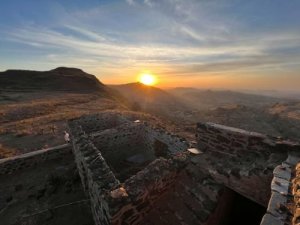
Chehat at Sunset – roof gone
We trekked back up to a village called Rahya, which had always been the trail head for this end of the trek. It’s an easy drive back to Adigrat from whence we headed north to Chehat guesthouse. Its a steep but easy climb into the mountains that flank the city, this time accompanied by two other guides – Biniyam and Fitsum, we reached the brow of the hill where Chehat stands commanding views to the north outlook to the famous monastery of Debre Damo and the Adwa mountains. It was just before sunset and the landscape looked stunning. However the guesthouse, having served as a post for Tigrayan forces was pretty badly damaged. There was no roof left but the walls had been built with cement as the local soil was not good for binding, and so they were still standing. One of the committee, a local priest, had accompanied us up there and informed us that the local cooks we are really keen to start working however the camp manager had been badly beaten and was not at all himself.
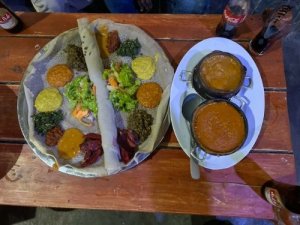
Wonderful fasting (vegan) meal at Mulat’s restaurant in Adigrat
We met up with another of the guides – Mulat and enjoyed a delicious dinner in his restaurant and a few beers. It was great to get the most of old team back together and they were full of enthusiasm for tourism to restart. Times have been unbelievably tough up here, tragic things have happened but people want to move forward and look to the future.
Adwa day, 2 March.
This day marks the anniversary of the Battle of Adwa when Ethiopian troops from across the country defeated the Italian invader, beside the mountains that were standing out in the sunset the last few evenings. I had breakfast in my favourite little café in Adigrat – Kaswa. I’ve eaten fouhl and drunk macchiato there each time I come to Adigrat for over a decade now. The owners know me and even know how I want my food. I spent the night at Berhe’s house, and we were up very early to head off to Hawzen, which is a large town on the edge of the Gheralta area made famous for tourists by Gheralta Lodge.
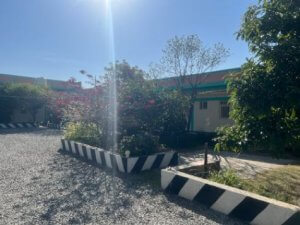
Hotel in Hawzen – refurbished
We checked out some local hotels in Hawzen. One of which was in pretty good condition as the owner has started refurnishing it and renovating it after it was heavily looted. Different armies came through Hawzen numerous times, there was fighting and there were a lot of people killed. A few miles down the road Gheralta Lodge has been heavily looted and vandalised. It’s going to take a lot of effort to get it back on its feet. Even further down the road Korkor Lodge just passed a small town of Megab, has also been vandalised and looted. We were accompanied bye our lovely Guide from the area – Gebre. It was the first time he had seen Korkor Lodge. Some of the owners family arrived and were looking at the damage and hoping to get compensation. It could be a long time before these lodges are up and running. Sadly we didn’t have time to visit the local rock hewn churches which are absolutely exquisite. We had to head back to Mekele for some meetings and my flight back to Addis .
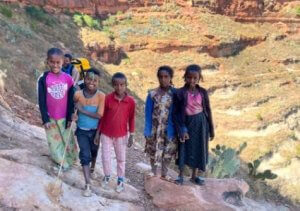
Children near Shimbrety
In Mekele we ate a delicious local meal before we met with the culture and tourism office. As the government has been operating without any budget or salary they have not been able to get out to see the extent of the damage themselves. So we were able to report that three guest houses were functional and could be used while three others need substantial reconstruction. They have offered us support in getting things up and running.
I contemplated what I had seen as I flew back to Addis, the resilience of the people, and the hope that tourism gives them for the future. It is very important that people start to come back to Tigray and visit the beautiful land, and greet its wonderful people. The wounds will take along time to heal across the whole country but connections with people from outside are important, and a feeling that some normality will return. See more details about the community treks in Tigray and please plan a trip to visit.


